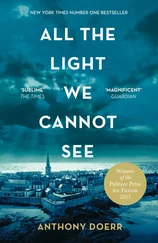About Grace
Anthony Doerr

This novel is entirely a work of fiction. The names, characters and incidents portrayed in it are the work of the author’s imagination. Any resemblance to actual persons, living or dead, events or localities is entirely coincidental.
Fourth Estate
An imprint of HarperCollins Publishers Ltd.
1 London Bridge Street
London SE1 9GF
www.4thestate.co.uk
First published in Great Britain by Fourth Estate in 2005
Copyright © Anthony Doerr 2005
Extract from All the Light We Cannot See © Anthony Doerr 2014
Cover photograph © Therese/Getty Images
Anthony Doerr asserts the moral right to be identified as the author of this work
A catalogue record for this book is available from the British Library
All rights reserved under International and Pan-American Copyright Conventions. By payment of the required fees, you have been granted the non-exclusive, non-transferable right to access and read the text of this ebook on-screen. No part of this text may be reproduced, transmitted, down-loaded, decompiled, reverse engineered, or stored in or introduced into any information storage and retrieval system, in any form or by any means, whether electronic or mechanical, now known or hereinafter invented, without the express written permission of HarperCollins ebooks
HarperCollins Publishers has made every reasonable effort to ensure that any picture content and written content in this ebook has been included or removed in accordance with the contractual and technological constraints in operatin at the time of publication
Source ISBN: 9780007146970
Ebook Edition © DECEMBER 2011 ISBN: 9780007405114
Version: 2018-10-08
for my mother and father
There must be some definite cause why, whenever snow begins to fall, its initial formation invariably displays the shape of a six-cornered starlet. For if it happens by chance, why do they not fall just as well with five corners or with seven?…Who carved the nucleus, before it fell, into six horns of ice?
From “On the Six-Cornered Snowflake,” by Johannes Kepler, 1610
Contents
Cover
Title Page
Copyright
Dedication
Epigraph
Book One
Chapter 1
Chapter 2
Chapter 3
Chapter 4
Chapter 5
Chapter 6
Chapter 7
Chapter 8
Chapter 9
Chapter 10
Chapter 11
Chapter 12
Chapter 13
Chapter 14
Chapter 15
Book Two
Chapter 1
Chapter 2
Chapter 3
Chapter 4
Chapter 5
Chapter 6
Chapter 7
Chapter 8
Chapter 9
Chapter 10
Chapter 11
Book Three
Chapter 1
Chapter 2
Chapter 3
Chapter 4
Chapter 5
Chapter 6
Chapter 7
Chapter 8
Chapter 9
Chapter 10
Chapter 11
Chapter 12
Book Four
Chapter 1
Chapter 2
Chapter 3
Chapter 4
Chapter 5
Chapter 6
Chapter 7
Chapter 8
Chapter 9
Chapter 10
Chapter 11
Book Five
Chapter 1
Chapter 2
Chapter 3
Chapter 4
Chapter 5
Chapter 6
Chapter 7
Chapter 8
Chapter 9
Chapter 10
Chapter 11
Chapter 12
Chapter 13
Book Six
Chapter 1
Chapter 2
Chapter 3
Chapter 4
Chapter 5
Chapter 6
Chapter 7
Chapter 8
Chapter 9
Chapter 10
Chapter 11
Chapter 12
Chapter 13
Chapter 14
Chapter 15
Chapter 16
Chapter 17
Acknowledgments
All the Light We Cannot See
Also by Anthony Doerr
About the Author
About the Publisher
Book One
He made his way through the concourse and stopped by a window to watch a man with two orange wands wave a jet into its gate. Above the tarmac the sky was faultless, that relentless tropic blue he had never quite gotten used to. At the horizon, clouds had piled up: cumulus congests, a sign of some disturbance traveling along out there, over the sea.
The slim frame of a metal detector awaited its line of tourists. In the lounge: duty-free rum, birds of paradise sleeved in cellophane, necklaces made from shells. From his shirt pocket he produced a notepad and a pen.
The human brain , he wrote, is seventy-five percent water. Our cells are little more than sacs in which to carry water. When we die it spills from us into the ground and air and into the stomachs of animals and is contained again in something else. The properties of liquid water are this: it holds its temperature longer than air; it is adhering and elastic; it is perpetually in motion. These are the tenets of hydrology; these are the things one should know if one is to know oneself.
He passed through the gate. On the boarding stairs, almost to the jet, a feeling like choking rose in his throat. He clenched his duffel and clung to the rail. A line of birds—ground doves, perhaps—were landing one by one in a patch of mown grass on the far side of the runway. The passengers behind him shifted restlessly. A flight attendant wrung her hands, reached for him, and escorted him into the cabin.
The sensation of the plane accelerating and rising was like entering a vivid and perilous dream. He braced his forehead against the window. The ocean widened below the wing; the horizon tilted, then plunged. The plane banked and the island reemerged, lush and sudden, fringed by reef. For an instant, in the crater of Soufriere, he could see a pearly green sheet of water. Then the clouds closed, and the island was gone.
The woman in the seat next to him had produced a novel and was beginning to read. The airplane climbed the troposphere. Tiny fronds of frost were growing on the inner pane of the window. Behind them the sky was dazzling and cold. He blinked and wiped his glasses with his sleeve. They were climbing into the sun.
His name was David Winkler and he was fifty-nine years old. This would be his first trip home in twenty-five years—if home was what he could still call it. He had been a father, a husband, and a hydrologist. He was not sure if he was any of those things now.
His ticket was from Kingstown, St. Vincent, to Cleveland, Ohio, with a stopover in Miami. The first officer was relaying airspeed and altitude through loudspeakers in the ceiling. Weather over Puerto Rico. The captain would keep the seat belt sign illuminated.
From his window seat, Winkler glanced around the cabin. Passengers—Americans, mostly—were reading, sleeping, speaking quietly to one another. The woman beside Winkler held the hand of a blond man in the aisle seat.
He closed his eyes, rested his head against the window, and gradually slipped into something like sleep. He woke sweating. The woman in the seat beside him was shaking his shoulder. “You were dreaming,” she said. “Your legs were shaking. And your hands. You pressed them against the window.”
“I’m all right.” Far below the wing scrolled reefs of cumuli. He mopped his face with a cuff.
Her gaze lingered on him before she took up her novel again. He sat awhile and studied the clouds. Finally, with a resigned voice, he said, “The compartment above you isn’t latched properly. In the turbulence it’ll open and the bag inside will fall out.”
She looked up. “What?”
“The compartment. The bin.” He motioned with his eyes toward the space above them. “It must not be completely closed.”
Читать дальше













